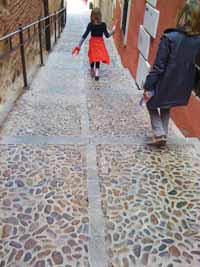Just Us Girls
Feeling proud that I’d conducted the entire business of buying our train tickets in Spanish and not once reverting to French, I pointed the girls toward the train station café. Buddy-roo strutted ahead of me, pulling the miniature rollaway valise – my mother’s old weekend travel case – that I’d packed for all three of us for our overnight trip. I liked the idea of one of my daughters dragging that same little black case behind her, evidence of the good-at-traveling gene successfully passing from generation to generation.
It’s comforting to me, the sound of a suitcase rolling behind you. I like hearing muffled departure announcements in another language that you have to strain to understand, or can’t comprehend at all. I’m at home at a train station café with a perk-me-up-coffee or a celebratory beer, anticipating the voyage ahead. I love to travel, so did my mother, and her mother. I think I’ve succeeded at infecting my girls with the bug, too.

“Why isn’t Papa coming with us?”
“He has to work. But we get to play.” The timing of his job was perfect. The girls were on vacances scolaire, a two-week winter break. We’d headed south, making stops in France and northern Spain, before driving on to Madrid.
“I thought it’d be good to have a little excursion,” I said, “just us girls.”
I’d envisioned the three of us, mother and daughters, traveling light with only our curiosity and a change of underwear, winding our way through narrow and yet unexplored (by us) cobblestone streets. A friend suggested a day trip outside of Madrid. I figured De-facto could use a quiet night to himself – a projection of my own preference for solitude before a job starts, or so he protested, when I informed him of my desire to stay overnight with the girls in Toledo.
Except it wasn’t De-facto who needed the break, it was me. We’d survived, remarkably well, through several long car trips and the zipping and of unzipping suitcases in a different hotel every few days, but I was reaching my limit. Unfortunately I didn’t realize this until we were at the station café, waiting for the call to board our train to leave Madrid. The girls battled fiercely about being next to or across from me, a good indicator that they, too, were over-saturated with our 24/7 companionship. My admonishments were met with pouty and insolent responses until eventually we sat at three separate tables. I questioned my sanity about being the sole adult chaperone at this ¾-mark in the vacation.
I looked at the barman and shrugged. “Una caña, por favor.” He nodded, knowingly, and poured me a cold glass of beer.
The train ride was just the ticket to distract them from their argument. The excitement of finding the right track, the correct coach and our designated seats obliterated the conflict that had caused such severe enmity. Thirty minutes later, our first view of the medieval walled city had them holding hands and jumping up and down. They were even good sports while we wandered in search of our hotel, a task made more challenging because of the maze-like pattern of Toledo’s narrow streets, and because we arrived at nearly the same hour as a public demonstration. We had to move fast or get stuck in (or run over by) the mass of marching protestors. I spotted a café-bar just ahead of the crowd; we sprinted to it and stepped inside, just in time to watch the long parade of chanting, banner-carrying protestors passing by.
stuck in (or run over by) the mass of marching protestors. I spotted a café-bar just ahead of the crowd; we sprinted to it and stepped inside, just in time to watch the long parade of chanting, banner-carrying protestors passing by.
“Who are all those people?” said Buddy-roo.
“They’re demonstrators. It’s like a manifestation in France, a political protest.”
“What’s a political protest?”
“They’re asking the government to change something that they don’t like.”
“Redonculous,” said Short-pants. “Why don’t they just write a letter?”
I explained that many letters had probably been written, but in certain situations a collective demonstration is necessary to get the government’s attention.
“It sounds like a big temper tantrum to me,” she said.
“Sometimes that’s what it takes.” I reminded her of the picture of my mother at the ERA convention in the 1970s. That wasn’t a protest, rather an attempt to make a law that would protect the advances already made by the determined women who’d protested and demonstrated so that women could enjoy the same rights as men. “As women – at least in our culture – the two of you have rights that you’d never have if the women from two and three generations before you hadn’t demonstrated in the streets, just like these protestors.”
“You mean like all those women who couldn’t go to the stoning, unless they were dressed as men?” Buddy-roo said.
We’d stayed two nights at a small rural hotel in the north of Spain that had a curious collection of VHS and DVD movies. The Life of Brian, though perhaps not the most ideal family entertainment, was one of the few movies we could watch in English. There is a scene where the participants at the public stoning of a criminal are women (or Monty Python cast members pretending to be women) dressed up as men. We’d had to explain, several times, the significance.

“Yes,” I said. “But I hope you never find yourself at a stoning, dressed as a man or a woman.”
“That’s redonculous,” said Short-pants, “there are no stonings anymore.”
I didn’t tell her – not yet, I will when she’s a little older – that there are places in the world where stoning still occurs, without anything resembling a fair trial. Or how the rule of law – and its boundary with religion – grows blurrier in my own culture these days. I read with furrowed brow the news about proposed legislation to define the personhood of a just-conceived zygote, or attempts to restrict a women’s access to birth control and advice about reproductive health care. When the term slut is used unapologetically by a national media host to describe someone standing up for her rights to birth control, I wonder if something akin to public stonings – with women as the primary target – aren’t coming back into vogue.
Mostly, I worry that my daughters’ generation could end up with fewer rights than mine. It doesn’t impact them now, living in France. But what if they moved back to the United States? Would Short-pants and Buddy-roo would be willing go to the streets in protest to protect the rights achieved by generations of women before them?
We spent the evening wandering the streets of Toledo, sampling tapas at various bars. The girls had stayed up for the late Spanish dinner hour two nights in a row and no doubt this contributed to their ornery outbursts. My strategy was to get a feel for the city by strolling and snacking on enough  tapas to feel like dinner. An early night would replenish the sleep in their banks and permit a better mood for tourist activities the following day. The girls are still just shy of the age to fully appreciate museums and churches, but I’d hoped to do at least a drive-by the cathedral and one of the synagogues and if possible peek into the El Greco museum. If I could squeeze in just that small taste of culture, I might be a bit less ornery too.
tapas to feel like dinner. An early night would replenish the sleep in their banks and permit a better mood for tourist activities the following day. The girls are still just shy of the age to fully appreciate museums and churches, but I’d hoped to do at least a drive-by the cathedral and one of the synagogues and if possible peek into the El Greco museum. If I could squeeze in just that small taste of culture, I might be a bit less ornery too.
They resisted the idea, but once I dragged them inside, they marveled at the vaulted nave of the cathedral. While we’re not a church-going family, we respect the opportunity it provides for contemplation and prayer, so we found a pew, seated ourselves quietly and bowed our heads. After her prayer, Buddy-roo made the sign of the cross and looked up at the likeness of Jesus on the crucifix.
“Hey, that looks like Brian,” she said, recalling their (now favorite) movie. The two of them broke into a whispered chorus of the film’s closing song, “Always look on the bright side of life.” Too tired to protest, I hummed along halfheartedly, hoping – praying – that we always can.


March 5th, 2012 at 12:47 am
This trip could go down in the annals of your family history. Keep the quotes tucked neatly inside. It is precious and few, my friend, who have this gift of capturing dialogue. Message for Buddy Roo and Shorts Pants: You girls are two of the luckiest in the world because you have a maman who records your lives for you, so rare these days!! Buddy Roo, keep taking notes!! Short Pants keep on asking questions! xxoo
March 8th, 2012 at 3:55 am
wow, she’s right.. “j”. I hadn’t considered that… I just love to read you. a
March 13th, 2012 at 11:16 pm
lord, i so hope so.
do you tell them to write letters? i do; to the president, to the school principal. she almost never does, but i do encourage it.
March 14th, 2012 at 1:12 am
Hmm. I agree that there are some really scary things going on. I guess, as parents, all we can do is arm our kids with the tools we think they’ll need to battle the wars of the future – wars, that, for the most part, we can’t even begin to predict.
I’m thinking that travelling and living in Europe may actually pay off in an interesting way for your kids; they’ll grow up seeing that the present and the future aren’t cut off from the past. Every time you go past an old cathedral, or trip on a cobblestone, you’re arming them with what they need to avoid the kind of “historical amnesia” that is often related to stepping on people’s rights and creating false dichotomies between “me” and “you”.
How’s that as further justification for wanting to give them a “small taste of culture”…;)
Besides, I’ve heard that the opposite of fundamentalism is irony, and how better to learn irony than to grow up quoting Monty Python! Should be required watching for all wannabee politicians. 😉
My daughter is quite a few years behind yours. So I will wait eagerly for you to solve all the world’s problems, and then it’ll be smooth sailing for me 🙂